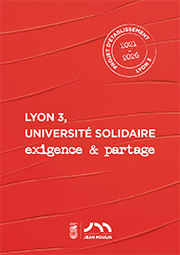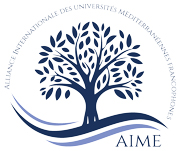AccueilRechercheProgrammes et productions scientifiquesThèsesThèses soutenuesThèses soutenues - 2006-2021Thèses soutenues - 2013
-
Partager cette page
- Recherche,
EL QOTNI CHLIAH Hanane
Les droits de l'enfant : Etude du droit fran?ais et droit positif marocain à travers la source du droit musulman.
Publié le 20 février 2013 – Mis à jour le 20 février 2013
Thèse en Droit de la famille soutenue le 22 janvier 2013
A partir d’idées purement théoriques sur l’enfance, fruits d’un bouleversement sociétal en occident au temps des Lumières, il a fallu des siècles pour accomplir le trajet conduisant à la reconnaissance juridique des droits de l’enfant : La Convention internationale des droits de l’enfant de 1989 marque l’aboutissement et le point de départ d’une nouvelle vision de l’enfant. Ainsi, les droits de l’enfant deviennent un enjeu politique et juridique pour tous les Etats qui l’ont ratifié dont la France et le Maroc. Si pour la France, la ratification de la CIDE a été le prolongement de réformes entamées au niveau interne, il s’agit pour le Maroc d’une première prise de conscience.
Néanmoins, la reconnaissance des droits de l’enfant ne s’arrête pas au stade de la ratification symbolique du texte international. Les Etats parties doivent rendre effective les dispositions de la CIDE que ce soit au niveau de la norme ou en pratique. La mise en ?uvre du texte international dont son applicabilité directe devant le juge, sa concrétisation dans le quotidien de l’enfant, l’adoption de sa philosophie et de sa nouvelle logique constitue les preuves de cette reconnaissance. En effet, c’est à ce stade là que les divergences entre les deux systèmes juridiques étudiés s’opèrent.
Entre débordements et manquements, omniprésence et occasionalité, chaque contexte et chaque système juridique appréhende la question des droits de l’enfant, notamment son effectivité en dépend de son histoire, de son processus socioculturel, de son système politique et également de sa situation socioéconomique. De cette manière, la CIDE devient un outil parmi d’autre et non pas un objectif en soi. Au final ce sont les droits de l’enfant qu’on veut réaliser et non pas le compromis des Etats signataires de la Convention.
From purely theoretical ideas on the childhood, the fruits of a societal upheaval in west in the time of the Lights, were needed centuries to carry out the route leading to the legal recognition of children rights: the International Convention on the Rights of the Child of 1989 marks the outcome and the starting point of a new vision of the child. So, children rights became a political and legal stake for all the States which ratified it among which France and Morocco.
If for France, the ratification of the CIDE was the continuation of reforms begun at the internal level, it is a question for Morocco of a first awareness
Nevertheless, the recognition of children rights does not stop at the stage of the symbolic ratification of the international text. Involved states have to make effective the capacitieS of the CIDE whether it is at the level of the standard or in practice. The implementation of the international text among which its direct applicability in front of the judge, its realization in the everyday life of the child, the adoption of its philosophy and its new logic establishes the proofs of this gratitude. Indeed, it is at this stage that the differences between both studied legal systems take place.
Between overflowing and breaches, omnipresence and occasionality, every context and every legal system dreads the question of children rights, in particular its effectiveness depends on its history, sociocultural process, political system and also its socioeconomic situation. In this way, the CIDE becomes a tool among of the other one and not the objective in itself. In the end it is the children rights which we want to realize and not the compromise agreed by the states who signed up the convention.
Mots-clés : The Rights of the Child : study of French law and Moroccan positive law through the source of Islamic law
Key words : Childhood, subjective rights, CIDE, Moroccan law, French law, Muslim law, universality, political and socioeconomic context, individualism, direct application, normative effectiveness and practice, overflowing and breaches, the search for the balances.
Directeur de thèse : Hugues FULCHIRON
Membres du jury :
GOUTTENOIRE Adeline, Professeur, Université Montesquieu Bordeaux IV
SAREHANE Fatna, Professeur, Université Hassan II - Casablanca
FOBLETS Marie-Claire, Professeur, Université de Louvain - Belgique
BIDEAU-GARON Christine, Ma?tre de conférences HDR, Université Jean Moulin Lyon 3
FULCHIRON Hugues, Professeur, Université Jean Moulin Lyon 3
Président du jury : Marie-Claire FOBLETS
Mention : Honorable
Equipe d'accueil : Centre de droit de la famille
Néanmoins, la reconnaissance des droits de l’enfant ne s’arrête pas au stade de la ratification symbolique du texte international. Les Etats parties doivent rendre effective les dispositions de la CIDE que ce soit au niveau de la norme ou en pratique. La mise en ?uvre du texte international dont son applicabilité directe devant le juge, sa concrétisation dans le quotidien de l’enfant, l’adoption de sa philosophie et de sa nouvelle logique constitue les preuves de cette reconnaissance. En effet, c’est à ce stade là que les divergences entre les deux systèmes juridiques étudiés s’opèrent.
Entre débordements et manquements, omniprésence et occasionalité, chaque contexte et chaque système juridique appréhende la question des droits de l’enfant, notamment son effectivité en dépend de son histoire, de son processus socioculturel, de son système politique et également de sa situation socioéconomique. De cette manière, la CIDE devient un outil parmi d’autre et non pas un objectif en soi. Au final ce sont les droits de l’enfant qu’on veut réaliser et non pas le compromis des Etats signataires de la Convention.
From purely theoretical ideas on the childhood, the fruits of a societal upheaval in west in the time of the Lights, were needed centuries to carry out the route leading to the legal recognition of children rights: the International Convention on the Rights of the Child of 1989 marks the outcome and the starting point of a new vision of the child. So, children rights became a political and legal stake for all the States which ratified it among which France and Morocco.
If for France, the ratification of the CIDE was the continuation of reforms begun at the internal level, it is a question for Morocco of a first awareness
Nevertheless, the recognition of children rights does not stop at the stage of the symbolic ratification of the international text. Involved states have to make effective the capacitieS of the CIDE whether it is at the level of the standard or in practice. The implementation of the international text among which its direct applicability in front of the judge, its realization in the everyday life of the child, the adoption of its philosophy and its new logic establishes the proofs of this gratitude. Indeed, it is at this stage that the differences between both studied legal systems take place.
Between overflowing and breaches, omnipresence and occasionality, every context and every legal system dreads the question of children rights, in particular its effectiveness depends on its history, sociocultural process, political system and also its socioeconomic situation. In this way, the CIDE becomes a tool among of the other one and not the objective in itself. In the end it is the children rights which we want to realize and not the compromise agreed by the states who signed up the convention.
Mots-clés : The Rights of the Child : study of French law and Moroccan positive law through the source of Islamic law
Key words : Childhood, subjective rights, CIDE, Moroccan law, French law, Muslim law, universality, political and socioeconomic context, individualism, direct application, normative effectiveness and practice, overflowing and breaches, the search for the balances.
Directeur de thèse : Hugues FULCHIRON
Membres du jury :
GOUTTENOIRE Adeline, Professeur, Université Montesquieu Bordeaux IV
SAREHANE Fatna, Professeur, Université Hassan II - Casablanca
FOBLETS Marie-Claire, Professeur, Université de Louvain - Belgique
BIDEAU-GARON Christine, Ma?tre de conférences HDR, Université Jean Moulin Lyon 3
FULCHIRON Hugues, Professeur, Université Jean Moulin Lyon 3
Président du jury : Marie-Claire FOBLETS
Mention : Honorable
Equipe d'accueil : Centre de droit de la famille
Documentation
Mise à jour : 20 février 2013







